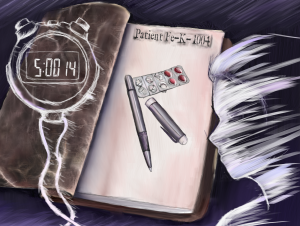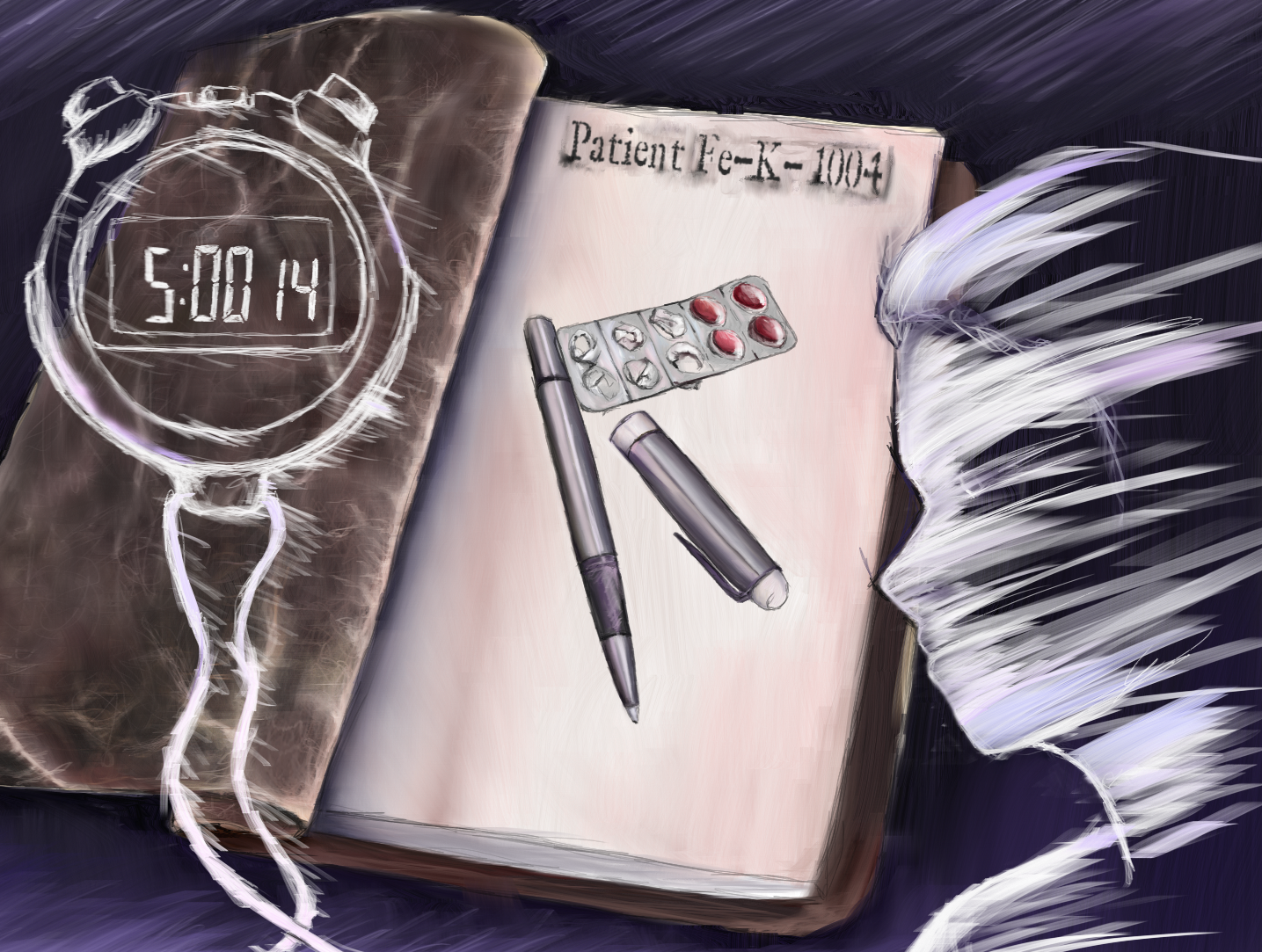An interview with Patient Fe-K-1004, as provided by Andrew Openshaw
Art by Justine McGreevy
The following recording was found on a memory stick discovered during excavations in the west of the city five years ago. Dated 14th January 2019, and kindly lent to us today by The Museum of Science and Technology, it provides us with an insight into the deplorable actions of the state during the “chem-tech” period.
Escalating military activities by the world’s global powers, combined with advances in science and technology, meant that many, at that time, unbelievable breakthroughs, were on the verge of happening. Of course, knowledge of these developments was kept secret. Even those in Government knew little of what was taking place in the largely privately funded research facilities dotted up and down the country.
The “chem-tech” years are in fact considered the most clandestine period in our recent history.
This interview is between two people. The first voice is that of a woman, the interviewer. A second voice then takes over the narrative. This is the subject, who we believe could be the author of the famous “Brunswick Diaries,” although that has never been confirmed.
Anyway, we’ll begin. Please listen carefully, and make as many notes as possible. No written transcripts exist. We also disabled your devices when you entered to prevent copies being made. I’m pressing play now.
~
“OK, WE’RE RECORDING. PLEASE START FROM THE BEGINNING. WE DON’T HAVE MUCH TIME, I MAY HAVE BEEN FOLLOWED. TELL ME AS MUCH AS YOU CAN.”
“Right. Almost ten years ago, I left my foster parents’ home and moved into a flat in the city with Kayla, who was only sixteen. Her parents had thrown her out when she’d told them she was pregnant. It was just me and her, all alone.
“I was working in a local factory on the production line. It was low pay, I needed cash. I’d seen a poster in the job centre. It wasn’t a big poster; it looked like it had been there for a while, fast disappearing behind a horde of other things pinned on top of it. Anyway, it was advertising a drug trial at the University. You still see these things often. Ideal opportunity for those who need to earn a quick buck. And this was good money too, £100 per day.
“The number of days wasn’t specified, but it did state it was a confidential trial. Under no circumstances could you discuss your involvement with anyone.”
“AND, NO RECORDS OF THIS TRIAL EXIST TODAY?”
“No, nothing. I’ve searched online, made enquiries at the University, the job centre. Nothing. Yes, in retrospect, I should have been more cautious about taking part in something like this. But, hey, I was nineteen, my girlfriend was pregnant. We had no support from our families. I was only thinking about the money, nothing else.
“I called the number, got an address of a facility on the outskirts of the city and arranged to go in the following week after work.
“I couldn’t afford buses or taxis back then, so I walked. It must have taken me an hour at least, and it was dark when I arrived. An orderly greeted me and took me to a holding room. He didn’t have a name. No one who worked there had a name–only a four-digit number attached to their shirt. I was asked to read and sign some forms.
“The details weren’t important to me. Like I said, the money was all I was focused on. Plus, it was late. I needed to get home to Kayla. It all looked fine. This orderly made it clear to me, however, that I couldn’t discuss anything about the trial with anyone. Any indication that I had spoken about it would lead to me not being paid. So, I kept schtum, not even telling Kayla what I was up to.”

The recording stops there. Now, the female journalist supposedly disappeared that same day. Rumours circulating at the time suggested she was investigating a sordid sex scandal involving high-ranking members of the government. It wasn’t uncommon for journalists to go missing back then. It was a dangerous profession.
To read the rest of this story, check out the Mad Scientist Journal: Summer 2018 collection.
Patient Fe-K-1004 (real name unknown) may be the author of the Brunswick Diaries, who took part in secret Government drug trials during the chem-tech period, testing medication later used by soldiers in the war. A car mechanic with a young family, according to his testimony he joined the trial after finding a poster in a local careers centre, promising lucrative payment for volunteers. He fled the research facility when his health deteriorated and lived homeless for a while, before receiving a small reward for his participation, allowing him to start new life.
Justine McGreevy is a slowly recovering perfectionist, writer, and artist. She creates realities to make our own seem slightly less terrifying. Her work can be viewed at http://www.behance.net/Fickle_Muse and you can follow her on Twitter @Fickle_Muse.
“Interview with Patient Fe-K-1004” is © 2018 Andrew Openshaw
Art accompanying story is © 2018 Justine McGreevy
